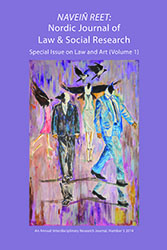Lawyers in Opera: The Transformation of the Legal Profession
DOI:
https://doi.org/10.7146/nnjlsr.v0i5.111080Abstract
For centuries lawyers, broadly understood as judges, notaries, legal officials and private practicing lawyers, have played important roles in society and been members of a strong profession possessing privileges. Also in operas, from the Italian Commedia dell’arte, ‘Il dottore’, to recent lawyer figures, judges, notaries, lawyers, courtrooms, prisons and legal cultures are exposed. These conditions have influenced the reputation of lawyers. This article contributes with reflections about lawyers’ identity through a fruitful inspiring collaboration between an opera singer and a legal scholar. At three levels of analysis, this explorative study searches for connections between societal requirements (what to do), professional requirements (how to act) and legal and ethical expectations of specific lawyer-like behaviour, morality and good citizenship (who to be). The article brings into a dialogue the world of law and the world of opera and compares the construction of lawyer identities in society with different lawyer roles in opera.
References
Aba, 2013, Journal, December, Arias at Law: Attorney creates an opera based on Justices Ginsburg and Scalia.
Alexander, C., 2011, ‘Learning to Be Lawyers - Professional Identity and the Law School Curriculum’, Maryland Law Review, 70 (2011-21).
Aubert, V., 1976, Rettens sociale funksjon. Oslo: Universitetsforlaget.
Balkin, J. and Levinson, S., 1999, Interpreting Law and Music: Performance Notes on ‘The
Banjo Serenader’ and ‘The Lying Crowd of Jews’, Faculty Scholarship Series. Paper 252.
Brante, T., 1988, Sociological Approaches to the Professions. Acta Sociologica, 31(2), pp. 119-142.
CCBE, (2008), Charter of core principles of the European legal profession and Code of
Conduct for European lawyers. Council of Bars and Law Societies of Europe.
Christiansen, 2014, Interview with Royal Opera Singer Christian Christiansen who sang
the part of Mr. Swallow in 1993 at The Royal Theatre in Copenhagen, directed by David Radok and conducted by Sir Alexander Gibson.
Claesson, 2014, Interview, about the music analysis of Mr. Swallow and Peter Grimes with Søren Kaas Claesson, violinist in The Royal Danish Orchestra.
Dalberg-Larsen, J., 2005, Lovene og livet. København: Jurist- og Økonomforbundets Forlag.
Giddens, A., 1991, Modernity and Self-identity - Self and Society in the Late Modern Age (1st ed.). California: Stanford University Press.
Hammerslev, O., 2003, Danish Judges in the 20th Century - A Socio-Legal Study. Copenhagen: Djøf Publishing.
Høedt-Rasmussen, I., 2014, Developing Identity for Lawyers – Towards Sustainable Lawyering. Frederiksberg: CBS Forlag.
ECJ 6 June 2002, Land Hessen v. Ricordi, , Case C-360/00, ECR (2002) I-5089.
Littauer, E., 2012, Libretto in two acts, inspired by Robert Louis Stevenson’s ‘Dr. Jekyll and Mr. Hyde’.(not published)
MacFarlane, J., 2008, The New Lawyer - How Settlement is Transforming the Practice of Law. Vancouver: UBC Press.
Mullerat, R., 2013, Law Practice in a Globalized World: The European Experience, Monnet/Robert Schuman Paper Series.
Orwell, G., 1945, Animal Farm. London: Secker and Warburg.
Padmore, E., 1993, Antihelten i moderne opera, København. Det kongelige Teaters tryk.
Paulik, A., 1948, Vocal Score, The Bat Operetta in three Acts from Meilhac and Halévy by
C. Haffner and Richard Genée. Music by Johann Strauss. Cranz-Mainz: Musikverlag .
Schneider, M. T., 2014, Postdoctoral Fellow, Dpt. for Performance Studies, Stockholm University, in an informal interview.
Spielmann, D., 2012, ‘Variations on an Original Theme: Music and Human Rights’, in
J. Casadevall, E. Myjer, M. O’Boyle and A. Austin (eds), Freedom of Expression. Essays in
Honour of Nicolas Bratza, President of the European Court of Human Rights. Oisterwijk: Wolf Legal Publishers, pp. 363-381.
Stein, E., 1945, Peter Grimes Vocal Score. Opera in three Acts and a Prologue Derived from
the poem of George Crabbe Words, by Montagu Slater, Music by Benjamin Britten, Boosey & Hawkes, Ltd. (London, New York, Sydney, Toronto).
The Royal Danish Theatre, 1993, Peter Grimes, Programme from 23 October 1993.
Voorhoof, D. & Høedt-Rasmussen, I., 2007, ‘Wettelijke bepalingen bevatten nooit een vraagteken’, in K. Lemmens (ed), Recht en literatuur. Brugge: Die Kevre
Wenger, E., 1998, Communities of Practice. Cambridge: Cambridge University Press.
Online inspiration
–– http://www.opera-guide.ch/index.php?uilang=en
–– http://operabase.com/index.cgi?lang=en
–– http://www.arkivmusic.com/classical/main.jsp
–– The drawings by Daumier have been a source of inspiration.
Downloads
Published
How to Cite
Issue
Section
License
Counting from number 12 (2022), articles published in NNJLSR are licensed under Attribution 4.0 International (CC BY 4.0). Readers are allowed to copy and redistribute the articles in any medium or format, to adapt and revise the articles, and use the articles for commercial purposes, provided that the readers give appropriate credits.
No Creative Commons licenses are applied on articles in number 1 (2009)-11 (2021). All rights reserved by the authors. Readers are allowed to download, read, and link to the articles published in volume 1 (2009)-11 (2021), but they may not republish or redistribute these articles without permission of the authors.

